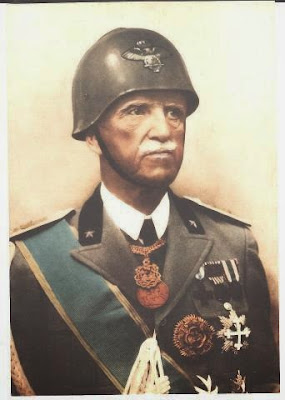Italian monarch during both world wars.
Born in Naples on 11 November 1869, the only child of Umberto I and Margherita
of Savoy, Victor Emmanuel, Prince of Naples, was tutored in a rigorous,
Prussian-style military regimen despite his diminutive size. He inherited the
Italian throne after his father’s assassination in 1900. Presiding over a
Liberal constitutional monarchy and playing Italy’s Triple Alliance position
against overtures to the Triple Entente, he procured Libya following the
1911–1912 Italo-Turkish War and entered World War I in 1915 on the side of the
entente. Fascist Party leader Benito Mussolini made a bid for primacy in ruling
Italy in 1922, and the king failed to remove him by invoking his cabinet’s
martial law decree; in 1924, he sealed the Fascist triumph by allowing the
embattled Duce to stay on despite widespread furor over the murder of socialist
leader Giacomo Matteotti by Fascist operatives.
The attentive yet reticent figurehead
acquiesced in the 1935–1936 Italian war with Ethiopia, the intervention in
Spain’s civil war, Mussolini’s inchoate anti-Semitic laws, the 1939 invasion of
Albania, the Pact of Steel approved later that year, and Italy’s ill-advised
declaration of war on the Allies on 10 June 1940. Witnessing his country’s abysmal
military efforts, the king did not relish being swept away in the inevitable
Fascist defeat. Retaining his authority over Italy’s armed forces, Victor
Emmanuel arrested Mussolini after his ouster by the Fascist Grand Council on 25
July 1943, replacing him with the army’s Marshal Pietro Badoglio.
Following the 8 September 1943 armistice
with the Western Allies, the king, with his family and aides, fled Rome for
Brindisi as German troops surrounded the capital, provoking the ire of his
subjects in liberated and occupied Italy alike. Urged by the Allies to
abdicate, he nonetheless clung to his title but relinquished power as his son,
Crown Prince Umberto, was installed as the ruling “lieutenant of the realm”
following the 4 June 1944 liberation of Rome. On 9 May 1946, the stubborn Victor
Emmanuel III formally passed the throne to Umberto II, but it was too late to
save the monarchy. He then went into exile in Egypt and died in Alexandria on
28 December 1947.
References
Ellwood, David. Italy, 1943–1945. Leicester, UK:
Leicester University Press, 1985. Katz, Robert. The Fall of the House of Savoy.
New York: Macmillan, 1971. Knox, MacGregor. Hitler’s Italian Allies: Royal
Armed Forces, Fascist Regime, and the War of 1940–43. New York: Cambridge
University Press, 2000. Mack Smith, Denis. Italy and Its Monarchy. New Haven,
CT: Yale University Press, 1989.

No comments:
Post a Comment